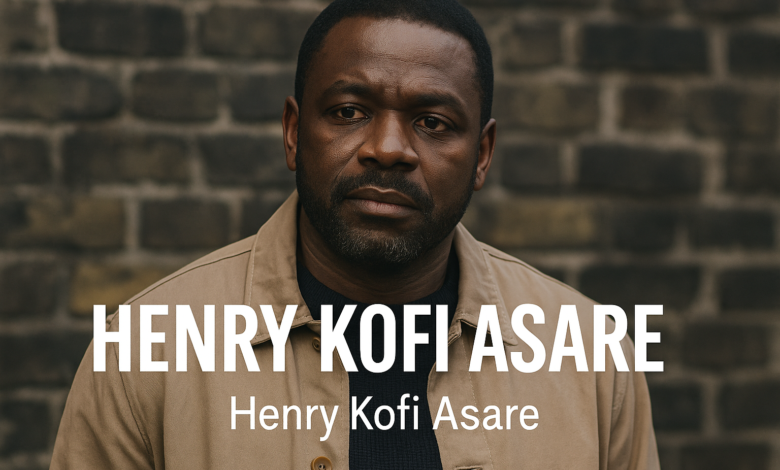Henry Kofi Asare: Unveiling the Truth Behind the EastEnders Character

In the ever-evolving world of British television drama, EastEnders has consistently delivered emotionally charged narratives that mirror real-life societal challenges. Among its recent storylines, the tragic tale of Henry Kofi Asare stands out for its powerful commentary on race, family, and loss. Although Henry is an off-screen character, his story has had a monumental impact on the current narrative of the show and has generated widespread intrigue.
So, who is Henry Kofi Asare? This article dives into the fictional yet socially significant background of this character, the legacy he leaves behind, and the broader implications of his story in the context of British history and television.
Early Life and Background of Henry Kofi Asare
Henry Kofi Asare is portrayed in the EastEnders universe as a Ghanaian man who migrated to the UK during a time when many Africans sought better opportunities abroad for themselves and their families. As with many immigrants in the 1980s, Henry and his wife Margaret Asare faced economic and social challenges while trying to build a life in a foreign land. Their dream was simple yet noble: to give their children access to opportunities they themselves could only dream of.
The Asares had three sons—George Knight, Kojo Asare, and Kobina Asare. In an effort to improve George’s future, Henry and Margaret arranged for him to be fostered by a British couple, Eddie and Gloria Knight. The arrangement was meant to be temporary and filled with hope. However, what followed was a series of tragic events that would change the course of many lives.
Henry’s Return and the Tragedy That Followed
In 1984, Henry Kofi Asare returned to London to reclaim custody of his son George. What should have been a joyful family reunion quickly turned into horror. Eddie Knight, driven by deeply rooted racial prejudice and an unwillingness to return George to his biological family, murdered Henry.
The crime was gruesome and calculated. Henry’s body was hidden in the Grand Surrey Canal, erasing any immediate trace of his disappearance. For years, Henry’s fate remained a haunting mystery to his family, particularly George, who grew up with a manipulated version of the truth about his parentage.
The Long-Buried Secret Revealed
It wasn’t until decades later, in a storyline that unfolded in 2024, that the truth about Henry Kofi Asare came to light. George Knight, now a grown man and a central character in EastEnders, embarks on a quest to learn more about his roots. What begins as a simple personal inquiry quickly escalates into a dramatic revelation when George learns the horrifying truth: his father was murdered by the very people who raised him.
The revelation not only shatters George’s understanding of his past but also opens up unresolved wounds tied to identity, belonging, and betrayal. The impact of this discovery resonates across the community, bringing to the forefront issues of racism, historical violence, and the importance of truth and reconciliation.
Character Analysis: Who Is Henry Kofi Asare?
Though never physically seen on screen, Henry’s presence is deeply felt. He is a symbol of integrity, love, and resilience. His efforts to reunite with his son highlight the strength and devotion that define parental love, particularly in the face of systemic challenges and prejudice.
Henry represents the countless immigrants who have been victims of racial violence yet whose stories remain untold. Through Henry, EastEnders brings to life a silent chapter of history that deserves recognition.
His legacy, carried forward by George and his brothers, speaks to the enduring strength of cultural identity and the healing power of uncovering the truth.
EastEnders and the Role of Social Commentary
EastEnders has long been known for weaving social issues into its dramatic narratives. With the story of Henry Kofi Asare, the show tackles racism, colonial hangovers, and the struggles of immigrant families in Britain with a new level of intensity and realism.
The writers and producers deserve credit for crafting a plotline that not only resonates with viewers but also prompts broader conversations about historical injustices. The show’s decision to introduce such a powerful backstory through a character like Henry ensures that these important topics are not relegated to footnotes but are given center stage.
This storyline adds depth and urgency to discussions around Britain’s multicultural identity, and how the nation grapples with the dark corners of its past.
Emotional Impact on the Characters
The character most affected by the Henry Kofi Asare storyline is undoubtedly George Knight. For George, the discovery is earth-shattering. He learns that his entire upbringing was built on lies. The people he believed were his family withheld a crucial part of his identity and were responsible for his father’s death.
George’s emotional arc is compelling. Viewers witness him moving from confusion and denial to grief, and finally to a complex mixture of anger and acceptance. This transformation allows audiences to engage deeply with the emotional toll that buried family secrets can have, especially when those secrets are tied to trauma and injustice.
Other characters, including Gloria Knight and Kojo Asare, are forced to confront their roles in the web of lies and their complicity—whether direct or indirect—in the erasure of Henry’s memory.
Reception and Audience Reactions
The introduction of Henry Kofi Asare’s story received strong reactions from both fans and critics. Viewers praised EastEnders for tackling such a hard-hitting and socially relevant storyline. Many took to social media to express how deeply moved they were by George’s journey and how it helped them reflect on similar experiences in their own communities.
Critics lauded the show for its courage in addressing issues that mainstream TV often avoids. The inclusion of an immigrant tragedy rooted in real historical issues gave EastEnders renewed relevance and positioned it as more than just a soap opera—but a platform for societal reflection.
Symbolism and The Broader Message
Henry Kofi Asare is not just a character; he is a symbol. His story represents the silent suffering of countless immigrants who sacrificed everything for a better life for their children. His murder, driven by hatred and buried in secrecy, is a metaphor for how society often hides its worst sins under the surface.
Yet, the uncovering of his truth brings about healing and awareness. It forces characters and audiences alike to confront the pain of the past, learn from it, and build toward a more just future.
Legacy of Henry Kofi Asare
The influence of Henry’s story doesn’t end with George. It changes the way EastEnders characters view race, privilege, and identity. It also reinforces the importance of understanding one’s roots and standing up for the truth, no matter how painful it may be.
By placing a character like Henry Kofi Asare at the heart of such a pivotal narrative, EastEnders ensures that the dialogue around racism and historical injustice continues. His memory serves as a reminder that silence can be deadly, but truth, once revealed, has the power to heal.
Conclusion
Henry Kofi Asare may be a fictional character, but his story is one that echoes real-life experiences of loss, injustice, and hope. Through his tragic fate and the emotional journey of those he left behind, viewers are given a window into the past that still informs the present.
This storyline offers not only entertainment but also education—reminding us all that the pursuit of truth, no matter how long it takes, is always worth it.
As the story of Henry continues to ripple through the EastEnders universe, it cements his place as one of the most powerful unseen characters in the show’s history.
Published by Digi Blogs.





